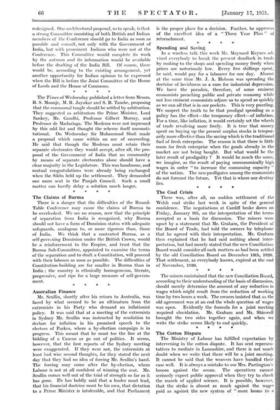Spending and Saving In a wireless talk this week Mr.
Maynard Keynes ad- vised everybody to break the present deadlock in trade by rushing to the shops and spending money freely when prices are notoriously low. Every five shillings spent, he said, would pay for a labourer for one day. Almost at the same time Mr. J. A. Hobson was spreading the doctrine of lavishness as a cure for industrial depression. We have the paradox, therefore, of some eminent economists preaching public and private economy while not less eminent economists adjure us to spend as quickly as we can all that is in our pockets. This is very puzzling. We suspect, the truth to be that prodigal spending as a policy has, the effect—the temporary effect—of inflation. For a time, like inflation, it would certainly set the wheels of trade revolving more freely. It is true that money spent on buying up the present surplus stocks is tempor- arily more effective than the saving which is the traditional fuel of fresh enterprise. The reason is that there is little room for fresh enterprise when the goods already in the market are not being bought. But what would be the later result of prodigality ? It would be much the same, we imagine, as the result of paying uneconomically high wages in order "to increase the consuming capacity" of the nation. The neo-profligates among the economists do not forecast the future. Yet that is where our destiny lies.




































 Previous page
Previous page